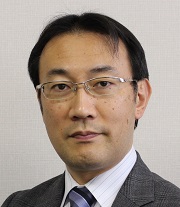KUSABA, Dr Tesshu
Japan - President, Japan Primary Care Association

Hello, dear readers. My name is Tesshu Kusaba. I am a Japanese family doctor. It is my pleasure and honor to be added to “WONCA featured Doctors”.
What work do you do now?
I have been working as a family doctor at Motowanishi Family Clinic in Muroran City of Hokkaido, since 2003. The clinic provides medical care through a three-member group system. The Outpatient Department treats about 40 patients with various health problems from a wide range of age groups daily. The Home-visit Department provides medical care for approximately 150 elderly people and those with disabilities monthly. As a member of the community medical association, I have been participating in preventive medical activities to promote community residents’ health and other activities to establish a community-based integrated care system. I have also been supporting policies to promote home medicine through collaboration with administrative bodies. Now that 15 years have passed, I realise that family medicine is being incorporated into the community.
As the Director of the Hokkaido Center for Family Medicine, I have been engaged in the management of 13 medical care facilities and promoting family medicine with about 50 family doctors and 250 employees. I have also been operating a family doctor training program, accepting about four senior residents each year. So far, more than 50 family doctors have completed the program. In addition to this, I am currently managing the family medicine advisor training program “Fellowship”. These activities to train family doctors are highly evaluated in Japan.
Other interesting things you have done?
Since April this year I have been President of the Japan Primary Care Association (JPCA). Our assocaition was founded in 1978 and is the oldest and largest association specialising in primary care in Japan, with 12,000 members at present.
Based on our objective (“practicing sustainable and integrated healthcare, medicine, and welfare and performing related academic activities, while placing importance on collaboration with community residents, to help people lead a healthy life”) and with the goal of establishing primary care as a basic infrastructure service for Japan’s society, the association expands activities mainly addressing three areas: disseminating primary care and enhancing its quality; nurturing primary care specialists and supporting their career development; and transmitting academic values mainly through clinical research and international activities.
Compared with other associations, we have energetic young members in their thirties and forties. The JPCA is also characterized by the extensive activities of various subcommittees which involve many people and we look to expanding future-oriented approaches at all times. Young members’ energy never stops stimulating me!
What is it like to be a family doctor in Japan?
In Japan, JPCA launched a system to nurture family doctors as specialists in about the year about 2000. However the number of specialist primary care doctors remains around 800; and as the total number of all doctors is approximately 300,000 in Japan, they only account for 0.27%. The traditional career pathway for Japanese medical doctors should be noted; many of them work at a hospital as a specialist of a specific organ for a certain period, subsequently open a private clinic, and then start to provide primary care. A large part of primary care is still provided by these doctors, but those who consider themselves as a primary care specialist remain in the minority.
However, facing strained finances to offer sufficient medical services in a super-aging society, the Japanese government advocates the nurturing of family doctors as primary care specialists who provide medical care for the elderly with pathological conditions complicated by multiple diseases and “requiring care, rather than cure”. In 2018, family medicine was officially defined as a new basic specialty area, and a system to nurture family doctors on a nationwide basis started.
Thus, family doctors who have received specialised training in Japan are expected to play leading roles in community-based primary care as pioneers. This is a very worthy task, but it simultaneously requires courage and strength to overcome various difficulties. Therefore, active communication and mutual support among family doctors throughout Japan are essential.
Your leisure interests?
Watching movies and seeing kabuki shows are recently my favorite hobbies. Running on a treadmill at the gym in my spare time is also one of my enjoyments. I began to take Japanese tea ceremony lessons more than 10 years ago, and was certified as a tea ceremony master. Regrettably, I have been so busy that I have not been able even to touch a tea whisk these years. It was my great pleasure to have the opportunity to make tea for international guests with my fellows at the WONCA APR Conference that took place in Kyoto in May.
At the same time as my professional life and JPCA involvement, I am a person who places importance on life-fulfillment, such as loving my home with my wife and 3 children and enjoying hobbies, including those previously mentioned and travelling.